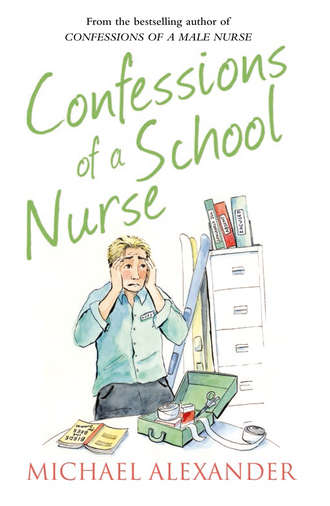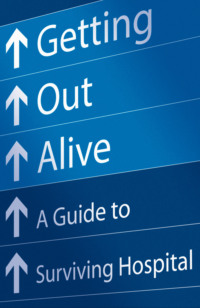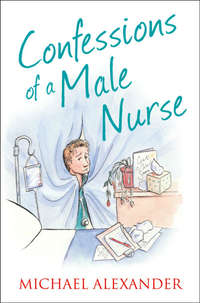
Полная версия
Confessions of a School Nurse
‘My nose is blocked,’ said Marie. I handed her a box of tissues and moved on to the next patient.
‘I feel dizzy,’ said Sarah. Blood pressure fine, pulse steady and strong, no medical history of note, but skipped breakfast – treated with banana and told to return to class.
‘I’ve got a cough,’ said Isabelle. Chest clear, cough non-productive, dry, had only for 24 hours, no fever, otherwise well, and has not coughed once in the last thirty minutes she’s been in the waiting room – told to take some cough syrup if it comes back, no treatment at present.
Marie hadn’t made it out to the hallway before the flood of tears began again. I stood and watched helplessly as she sat back down between Sarah and Isabelle, who instantly put their arms around her. For teenage girls, tears are contagious, and within moments the three of them were weeping quietly, hands entwined, consoling each other with mumbled words and the occasional glance in my direction, pleading with their eyes for some sign of compassion from me.
I’d never managed to upset three fourteen-year-old girls at once before, but I was doing a fine job of it. I’d even made it an international event, as Marie was Italian, Sarah American, and Isabelle from Russia. I’d covered half the globe.
What the heck should I do?
I did what any male would do when confronted with such a convincing scene. I ran for the hills!
Not really.
I let all three of them rest in the bedroom for an hour and made them some camomile tea with honey.
‘We won’t bother you again all week,’ promised Marie as she went back to class.
‘Thank you so much,’ said Sarah.
‘You didn’t forget to excuse us from class?’ asked Isabelle, making sure they didn’t get an absence marked on the computer.
‘You’re all excused. No need to worry,’ I assured them.
I had just let myself be played. They knew it, and they also knew I knew they knew. I suspect they felt obliged to push the limits. They had three new nurses, completely new to the world of boarding schools, and in these first few months everyone was still figuring out their boundaries. But if I was to continue treating these students like we were in a hospital trauma centre, I was never going to come out on top. I had to come up with another strategy, because if 90 per cent of the patients I had seen this morning had turned up to their local hospital, they would have been encouraged to turn away, or put at the back of the queue and wait hours to be seen.
Hospitals are great for treating accidents and the seriously unwell, but my role as a boarding school nurse was much more than just looking after the sick.
I’m more than a nurse; I’m a parent to these kids, a disciplinarian, an example, a counsellor, a mentor and often a dry shoulder to cry on. It sometimes means playing along with them and their antics, their dramas, and it also means knowing when and how to set limits – you have to know when to say ‘enough is enough’.
One moment I can be reprimanding a kid for bad behaviour, the next I’m consoling a child whose grandfather has just died. Before starting this job I had reasoned that my role would be varied and that I would end up doing things outside my job description. What I was not prepared for was to constantly be playing detective.
In a hospital setting, you tend to believe what the patient tells you. This makes sense as most people don’t like waiting hours to be seen for no reason. But everything’s different in a school, where students are looking for excuses to get out of class or homework.
To avoid being taken advantage of, I began to develop some unique (patent pending) assessment techniques.
‘Sir, I’ve got a sore throat’ was one of the most common complaints. After a quick peek at their throat I could usually tell if they were exaggerating, or outright lying. If it looked OK and they had no fever, I would send them to class with some lozenges and paracetamol. This was never the desired result, and within my second week on the job, the children had become resilient to my tactics.
‘I vomited during the night, and my throat is sore,’ said Marie, the very same Marie who had burst into tears only a week earlier with a blocked nose. Marie had not kept her promise about staying away, she had already become a regular.
Every year there are a dozen or so regulars who stop by two or three times a week, and the reasons vary. They may be homesick, or it may be their first time being unwell without their mother around. Often this changes once they make friends or figure out where they fit in. Sometimes all they need is a wave, a smile, a nod of the head that says ‘I’m here for you’ and ‘you belong’.
The problem with Marie was that she looked in fantastic health. Sure, she could have been up all night vomiting, and one symptom of a bad sore throat (strep throat) is actually an upset stomach so her history does need to be taken seriously as there are potential complications. However, while this is plausible, generally if the throat looks fine, and they have no fever, then I’m stuck with a healthy looking student, with a normal looking throat, who simply claims they’ve been up most of the night vomiting.
‘Your throat is probably sore because of so much vomiting,’ I tentatively suggested, ‘and your throat actually looks fine, you’re not pale, and your tummy doesn’t seem to be making too much noise …’ My voice trailed off as Marie looked ready to shed some tears, but I completed the ritual: 750mg paracetamol (based on her weight), throat lozenges, honey and camomile tea, and a late pass to class.
‘Can’t I rest, for just one class?’ she asked, but her heart was no longer in it. She had won a partial victory with a late pass, my kindness and a detailed explanation of what my examination had found – nothing – and she relented and left, although I did offer her a vomit bowl on the way out, telling her to ‘come back if you fill it up’.
When they don’t get the reaction they want, occasionally a student’s mouth drops open, they pull out their iPhones and dial their parents. Others just head to class. Fortunately, this relationship had moved on from that first teary-eyed encounter, and Marie and I had come to an unacknowledged yet mutual understanding, where she got the full works – medicines, honeyed tea and a late pass – and did not cry or insist on resting in bed. She took the bowl with a sheepish smile. She was ‘well enough’ to appreciate my wry stab at humour.
I’m usually vindicated by lunch break when I see the kids who were supposedly up all night vomiting disregarding my advice about avoiding fried/heavy food, eating fries and hamburgers at lunchtime with no obvious ill effects.
Of course, I did get it wrong sometimes, and continue to do so even now from time to time, but I was adapting. I’d sussed the kids out – who were the ones to keep an eye on – and in turn they were beginning to work me out too.
Agent trouble
‘You will let her rest now,’ demanded Mr Kowski. My finger itched closer to the ‘end call’ button, but I controlled my temper and my ego. Mr Kowski is far from the first, and will definitely not be the last person to have a go at me. The skill is in keeping your voice steady and calm.
Mr Kowski was calling from Moscow and was Irina’s agent.
Irina had just turned fifteen, but was already a regular in the first couple of months of school; at least two to three times a week. As far I could tell she had received great care – the camomile tea, late pass to class, the full check-up of subjective symptoms.
She’d come to the health centre this morning at two minutes to eight, right before the bell for morning class.
Irina claimed she was up all night vomiting, and had not slept, and was having to constantly run to the toilet. But I didn’t believe her.
Why didn’t I believe her?
Everything was normal. Her stomach was quiet, her temperature fine, her pulse and blood pressure normal, her lips and tongue moist, with none of that furry ugliness you normally get when your stomach contents are forced up and out. But people can have normal observations and still be sick. What they don’t do is look so great.
Irina’s eyes weren’t tired, they were lively, and she smelled good, of quality perfume, not the stench of recycled acid and dehydration. She’d also waited until the last minute to see me as well. When you’re that sick, you can’t wait to get someone to help. I find the genuinely sick waiting for me to open the door at seven in the morning still in their pyjamas.
After an examination I had tried to send her to her lessons, with no success. Instead of tears, she chose a more formidable weapon. She pulled out her iPhone.
Irina’s parents were furious, and like many of our students from non-English speaking countries, they had someone else speak on their behalf. Saudi and South American families usually have a secretary, a family friend who takes care of business, while the Eastern European families have agents. They use an intermediary either because their English is not good enough, or because they’re too busy to deal with minor issues like a sick child.
The family secretaries tend to be nice, while the agents are rarely so friendly. ‘I’m paid to be angry,’ one agent even confessed. ‘If a parent shouts at me, then I’m to shout at you.’ But I wasn’t going to ask Mr Kowski if his bravado was just an act.
I’m convinced yelling is a cultural thing. In some places, to yell at those under you, especially if you’re the one paying their salary, is normal, and I’ve even had students admit that if their fathers didn’t yell at their employees, nothing would be done. ‘They expect it,’ they explained.
I told Mr Kowski that, from my medical experience, Irina appeared well. ‘Are you saying she’s lying?’ His tone had quietened, but the threat no less.
‘Yes, she’s lying,’ I wanted to shout. Even good kids try to pull a fast one sometimes.
‘I’m not saying she wasn’t sick. What I am saying is that physically she seems well, and seems to have made a fantastic recovery.’
‘That may be so, but you make her rest, or else.’ Some battles are not worth fighting; they’ll cost you too much.
Irina spent the morning asleep. She had no further vomiting and I did not see her get up once to go to the bathroom.
I had to find a better way to get to the truth.
To aid me in my quest for certainty, I developed the PMU test. If a female turns up to the clinic in the morning, claiming she has a sore throat and has been up all night vomiting, but her make-up is immaculate and she looks great, then she has failed the Positive Make-Up test, and I am less likely to believe her. Obviously, this test is only applicable to girls.
Take Sara. Sara couldn’t see: ‘Sir, my eyes, everything is blurry,’ she insisted. She actually reached down, feeling for the chair behind her. This was one of the more unusual presentations, but I wasn’t concerned. She’d not only navigated her way out of her dorm and into the health centre, but her eye-liner was straight and her mascara not too heavy or too light, but just right. Her eyesight improved dramatically when I volunteered to be her guide and walk her to class. She nearly missed her English test.
Whereas Angela hadn’t slept an ounce. ‘My diarrhoea has been non-stop.’ She limped in with the assistance of her roommate, because that’s what diarrhoea does I guess. Both of them had perfect make-up. Obviously the bathroom didn’t smell bad enough to keep them away from the mirror, but I kept Angela for one hour during which I saw no symptoms. After forgetting to limp around my office, she made her way back to class having missed her PE class.
I can’t remember any patient in my twenty years of nursing putting on make-up after a miserable night spent in the loo emptying the contents of their stomach. I’m not talking about a touch of lippy, or a brush with some colour, I’m talking about the sort of make-up you use when preparing to take on the town, the complete works.
This was a breakthrough: a simple positive or negative test, which would help me sort the real from the fakes.
But unfortunately, it was only a matter of weeks before some of the students figured this out.
I’m not sure how they cottoned on to it, although I suspect Irina was the first to make the connections. A month after my run in with her agent, Irina turned up again with the same stomach problem, but this time without the layers of make-up, no perfume, a nice bedhead of hair, and wearing pyjamas.
Now I was stuck with a healthy looking patient, with no symptoms, no make-up, claiming she had a sore throat and had been up all night vomiting.
‘Who are you?’ I said when I first saw Irina in such a state. Oddly, without her make-up she actually looked healthier and brighter, more natural.
‘Sir, I’m sick, don’t make fun of me.’
It was at this stage that I gave up. If a child is so determined not to go to school, my job is not to figure out what is fact or fiction, but to go by their history. So I let her go to bed, but I made sure she had a bowl to throw up in, and told her I expected to see some vomit, or else.
After nearly ten years looking after school children, I’ve learned to pick the genuine from the not so genuine, but my greatest fear is missing the one child who looks only mildly unwell and sending them on their way with something major. This problem is exacerbated by the fact that on a day when there are activities, such as skiing, hiking or swimming, I can easily see up to fifty kids, all trying to get a medical excuse. Everyone loved such activities in my time, but this generation is different, delicate even.
But back then, I was still finding my feet. I had to rethink my strategy as to how best to manage the children.
Taking the lead
I could no longer just take patients at their word, especially when all their symptoms were so subjective. And I clearly still had a lot to learn.
‘I have a migraine.’
‘Are you sure?’
‘I have a migraine – a headache.’
‘There’s a difference between a migraine and a headache, do you have any symptoms?’
Chrissy sighed and rolled her eyes as if speaking to a simpleton. ‘My … head … is … sore.’
The ‘migraine’ sufferers are the easiest to catch. A real migraine sufferer looks absolutely miserable, and just wants to lie down with a pillow over their head and a bucket beside them. Not only did Chrissy look fine, she also had the energy to be sarcastic and roll her eyes. But knowing someone’s lying doesn’t necessarily make it easier to catch them out.
‘How do you know it’s a migraine?’ I asked.
‘Mum has them, and she said I do as well.’ So many people have no idea of any of the symptoms of a true migraine. But perhaps Chrissy had the beginnings of one.
‘Do you feel like vomiting?’ She nodded her head.
‘Visual disturbance?’ Another nod.
‘Dizziness?’ Of course.
I naïvely asked her to rate her pain on a scale of 1 to 10, with 10 being the worst pain she could ever imagine.
‘Nine or ten.’
She seemed prepared to say yes to every symptom I described. She should be curled up on the floor, her arms wrapped over her head, pleading for us to put her out of her misery.
‘It sounds like a real bad one, you’ve probably got some diarrhoea as well.’ Chrissy thought over her response, unsure if I was testing her (which I was) before suggesting that things had seemed a little ‘looser’ than normal that morning. I gave up. Two 500mg tablets of paracetamol, one hour rest, and she went back to class, symptom free. I found out later that she had missed her Maths test because she was resting in the health centre.
What did I learn? I learnt to keep my mouth shut, which is quite different to what I’d do in an emergency room. When you’ve got a forty-year-old man with chest pain, you question their symptoms because it helps define the problem, and may just save their life. Questions like ‘Does the pain go down your left arm?’ or ‘Do you have pain in the jaw?’ are absolutely vital.
But at the school, I didn’t want to ask them if they had any visual disturbance, nausea, vomiting, aura, pins and needles, as the moment I gave them some symptoms to choose from, they usually chose the lot. Without fail, those who have real migraines know their symptoms and do not hesitate to let me know.
Basketball
I like Sunday nights at the school, because they’re usually pretty quiet nights to be on call. There are no activities, no drinking (that we know of) and usually little chance of the kids getting into trouble because they’re back in their dorm preparing for the week.
But when the phone rang at 8pm one Sunday I received a rude awakening.
‘You have to come quickly, there’s blood everywhere. Come now, quick!’
The line went dead. I was about to press redial when the phone rang again. ‘Sorry, it’s me, Brian. I’m in the gym; you have to come quickly, Steve’s real bad.’
Brian was the coach of the school basketball team. He was normally a level-headed guy, but like many people involved in nasty looking accidents, when the adrenaline kicks in, they’re not the most coherent. I told him to slow down, take a couple of deep breaths, and tell me what happened.
After a pause: ‘We were playing basketball, practising for the tournament next weekend. Steve took a fall. It’s his arm. There’s blood everywhere. I don’t know what happened; it’s real bad.’ An arm injury with lots of blood didn’t sound good at all. The worst-case scenario I could think of involving bones and blood was a compound fracture, that is, a broken bone that is also poking through the skin.
I could hear screaming in the background and grabbed my first-aid kit and car keys and headed out the door.
I walked into chaos. There were two adults with Steve, and a horde of boys surrounding them all offering advice at the same time. Yet through all this noise I could hear Steve screaming in agony.
I was the only medic on the scene and it was up to me to do the right thing.
‘Don’t move him.’ As I pushed my way through the crowd, the kids were yelling their diagnoses.
‘It’s his back, he’s broke his back.’
‘Oh shit, there’s blood everywhere, I think I’m gonna puke.’
As I reached Steve and knelt beside him, I grabbed the shoulder of James, the assistant coach, and ordered him to remove all the boys from the gym. Some resisted, determined to help, others were happy to be led into the foyer, speechless, helpless, but grateful for some direction.
In any situation where there’s a crowd, the best thing you can do is to have someone remove the onlookers. I’ve seen a lot of people with what initially appears to be a serious injury calm down and walk away without any problem once the jittery, frenzied bystanders have been removed. It’s also impossible to do an assessment with a screaming horde of onlookers.
Steve was sitting on his backside, clutching his right arm, the front of his shirt covered in blood. I breathed a sigh of relief when I realised the blood wasn’t coming from an open wound on his arm but from his nose.
I imagined myself back in the triage room. One of the basic rules of triage is the ABC:
A – his airway was clear, although his nose still had a trickle of blood coming from it.
B – judging by the groans of pain his breathing was fine.
And as for his C – well, he hadn’t passed out and he was able to sit so he had an adequate circulation.
Clearly something was wrong and causing a lot of pain, but it was probably not life threatening just yet. I asked him what had happened.
‘Please just do something … it’s killing me.’
I promised Steve I would do something shortly, but stressed that I did need to know what happened.
Steve had been jumping for a shot when he received an elbow to the nose and came down on his right shoulder. He said he hadn’t hit his head or lost consciousness.
It’s tempting to tackle the most obvious injury first, and while I could see him clutching his arm, I wanted to be doubly sure to rule out any possible head injury and anything more substantial than a bleeding nose. Alongside the A, B, C is an often unknown little addition, another C, for C-spine.
C-spine, in other words, the bones that make up your neck, should always be checked for injury before moving a patient. The problem is, I’ve only ever assisted the doctors when they do such things. I’m the one who leads the ‘log-roll’ when turning patients with possible back injuries. I’m the one who holds the neck still while the doctor gently prods his finger around the back of the neck. If I stuff up and make a sudden move, it can mean a patient is paralysed for life. But now it was up to me to decide the best course of action.
‘Is your neck sore?’ I asked.
‘It’s my arm, please just fix the bloody arm, please do something,’ he begged. But I didn’t get a definitive ‘yes’ or ‘no’, and I had to be sure.
‘I’m sorry mate, I’ll get to the arm next, but I have to know for sure. Were you knocked out at all, and is the back of your head or neck sore?’
‘Geez, they’re fine, the arm, please …’
To be 100 per cent confident, I placed my fingers on the back of his neck and he denied feeling any pain when I gently pushed. I moved on to the arm.
I asked Steve to sit up straight and he tried, but he wouldn’t let go of his right arm. ‘It’s too painful, I just can’t.’ He had straightened enough for me to see that his right shoulder was not the same as the left. It was obviously dislocated. I checked the pulse on his right wrist and felt his hands. His pulse was strong and his hand warm. No circulation problems there … yet.
Not all shoulder dislocations are obvious, especially in the hospital setting where we see people of all ages and sizes. The size of a person can make it difficult to tell. Often frail people don’t even need to have an accident or any overt force involved to dislocate a joint, and their statures make it hard to see if something’s out of sorts. But a seventeen-year-old boy on the basketball team is likely to be tall and skinny. The poor lad didn’t have enough flesh on him to hide anything.
My clinic was only 100 metres away and with the help of Brian and James we managed to get Steve lying on the examination table. I tried calling Dr Fritz but got no answer. I remembered that this was one of the few weekends he had off; we were alone.
‘Fuck!’ Steve was trying to find a comfortable position but not succeeding. ‘Just fucking do something, fuck, fuck, fuck …’ He carried on screaming, pleading, while I didn’t have the courage to tell him that there was no doctor.
Steve had found the best position to ease the pain a little. He was lying face down on the examination table with his right arm hanging down off the side. ‘Please do something soon. I can’t take this anymore.’
In such instances the emergency call was directed to the next village over, usually a thirty-minute drive away. The next option was the ambulance, but the nearest ambulance was forty minutes away, which would mean at least an hour and a half before he got to hospital. My other option was to take him by car, screaming all the way. With such limited and unappealing choices, I opted for driving.
‘Please, I can’t move. Don’t touch me. I can’t move.’ We couldn’t get Steve to move off the bed let alone into a car. He’d found himself in a slightly less agonising position and was not going to budge. I needed some advice.
I try to avoid calling my colleagues, Justine and Michaela, when they’re off duty because time off is supposed to be just that, and like all nurses, I know, when you ask someone for help, they will never say no. Michaela was no different and was happy to help out. In fact, Michaela relished the challenge of a decent trauma. I instantly felt reassured by her upbeat tone when she arrived.








